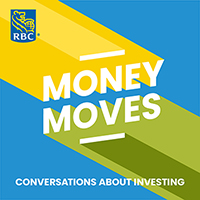How to Boost Your Resiliency as an Investor
Written by The Content Team
Published on May 13, 2020
minute read
Share:
Weathering stormy market conditions is never easy, no matter how experienced we are as investors. Let's face it, emotions often take over our more rational thoughts – whether prices are soaring or slumping.
Stu Kedwell, Senior Vice President and co-head of North American equities at RBC Global Asset Management, has spent years studying risk, volatility and the impact of emotions on investing, giving him a unique perspective on what it takes to be an equity investor and how to ride the ups and downs of the markets. He sat down with personal finance writer Melissa Leong for an episode of the Money Moves podcast on the Globe and Mail's website to shed light on risk and to offer smart strategies for managing our emotions.
First off, just what is volatility? Why are there storms we're forced to weather at all?
"Volatility is the notion that more things can happen than will happen," Kedwell says. "At any given point in time, the stock market needs to price a whole variety of outcomes." And prices, he says, are a reflection of trying to measure the probability of what might happen given everything we know at a certain point in time.
He offers the analogy of a $150 million airplane landing to explain.
"What is the value of the plane when it's one foot from the ground? Would you pay $150 million for that plane or would you prefer to see it land? That's the question that we have to ask ourselves. It's the notion that maybe it won't work out," he says. Even though evidence suggests that over time things generally work out, he says it's the uncertainty in that single point of time that causes the volatility.
Kedwell notes, however, that volatility isn't always a bad thing. "Most people associate volatility with downward movement, but volatility goes in both directions," he says.
Knowing how you'll deal with market volatility comes down to your tolerance for risk – which can be different when it comes to investing than how you manage risk in your everyday life. Kedwell suggests asking yourself how you would react if an asset you owned dropped 10 per cent, or, on the flip side, how you would react if you didn't own something and it went up 10 per cent.
"Most people are more focused on the potential for loss than they are on missing potential for gains," he says. In the behavioural finance field, it's what's known as loss aversion.
Understanding risk is one thing, but how do we keep our emotions in check and boost our resilience as investors? Kedwell offers up the following helpful suggestions on both points.
Keep an investing diary
Investing record-keeping can cover more than just the specifics – things like how many shares you purchased, when you purchased them and how much they were. "Some people keep an investing diary so that they can go back and revisit the emotion they felt and how they acted," Kedwell says. It can help you determine whether actions you took in the past based on how you were feeling about the markets worked out in your favour, or not. You can "build a warehouse of information about yourself as you go through these different periods of time."
Consider the benefits of dollar-cost averaging
For those who know they're prone to knee-jerk reactions, Kedwell suggests dollar-cost averaging might be a useful tool, providing investors with a roadmap in advance. The general concept involves investing a set dollar amount on a regular basis regardless of current market prices. Find out more about it here.
Read, read, read
Kedwell believes that reading as much as possible about historical events can help us shed light on what might be happening around us at any given time. While remembering that past performance doesn't guarantee future performance, Kedwell says there can be parallels to help us understand current events more clearly.

To hear more of the conversation between Kedwell and Leong, including Kedwell's take on the Rule of 72 and the power of compounding, check out "How to be ok with risk," episode three of the Money Moves podcast, brought to you by RBC Direct Investing and the Globe and Mail.
RBC Direct Investing Inc., RBC Global Asset Management Inc. and Royal Bank of Canada are separate corporate entities which are affiliated. RBC Direct Investing Inc. is a wholly owned subsidiary of Royal Bank of Canada and is a Member of the Investment Industry Regulatory Organization of Canada and the Canadian Investor Protection Fund. Royal Bank of Canada and certain of its issuers are related to RBC Direct Investing Inc. RBC Direct Investing Inc. does not provide investment advice or recommendations regarding the purchase or sale of any securities. Investors are responsible for their own investment decisions. RBC Direct Investing is a business name used by RBC Direct Investing Inc. ® / ™ Trademark(s) of Royal Bank of Canada. RBC and Royal Bank are registered trademarks of Royal Bank of Canada. Used under licence. © Royal Bank of Canada 2020. All rights reserved.
The views and opinions expressed in this publication are for your general interest and do not necessarily reflect the views and opinions of RBC Direct Investing. Furthermore, the products, services and securities referred to in this publication are only available in Canada and other jurisdictions where they may be legally offered for sale. If you are not currently resident of Canada, you should not access the information available on the RBC Direct Investing website.
Explore More

5 Ways to Get More Out of Your RESP
How can you make the most of this investment vehicle? We explain.
minute read

There's an ETF for That!
Find out more about the options that are out there
minute read

ETF Trends from the RBC Capital Markets Trading Floor – May 2025
Here’s what we saw on the trading floor in May 2025
minute read
Inspired Investor brings you personal stories, timely information and expert insights to empower your investment decisions. Visit About Us to find out more.







